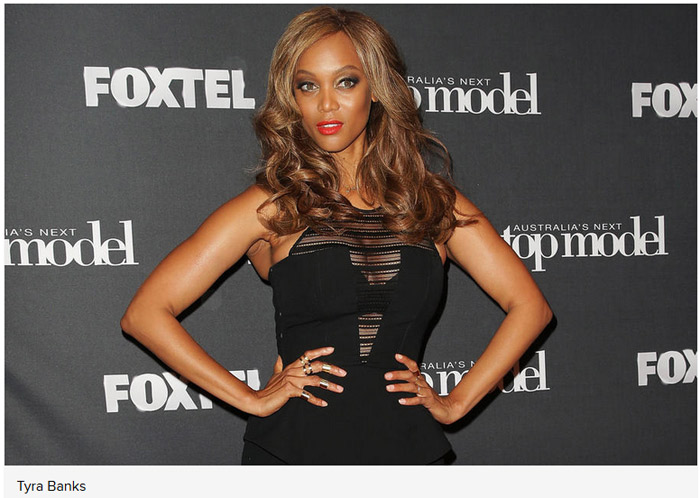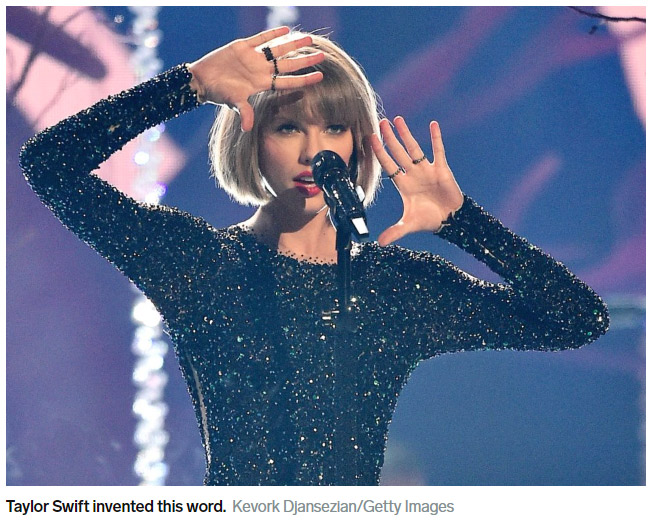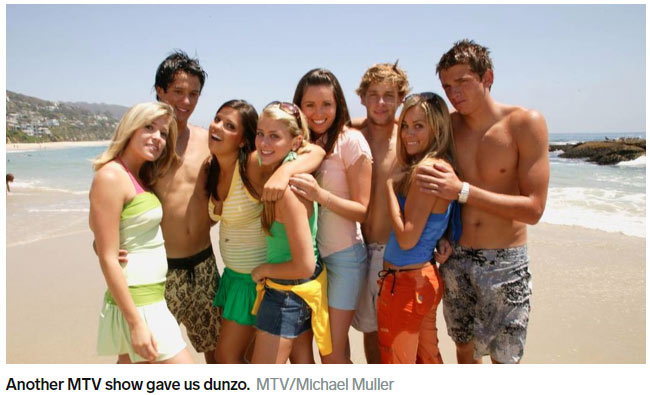這些新詞因名人而生 來看看它們都是什么來頭? 10 words coined by celebrities
中國日報網(wǎng) 2018-11-14 08:50

眾所周知,名人是各種潮流的靈感來源,但有時候他們也會不小心“造”個新詞出來。下面這些你用得很順手的新詞,都是拜名人所賜。
泰拉·班克斯(Tyra Banks):smize

Over the course of the 20 plus seasons of her show "America's Next Top Model," Tyra Banks invented a handful of words ranging from "flawsome" (embracing and loving your flaws) to "drekitude" (wack, disgusting, wrong).
泰拉·班克斯在20多季的《全美超級模特兒新秀大賽》節(jié)目中發(fā)明了很多詞,從flawsome(接受并愛上你的缺陷)到drekitude(古怪、惡心、錯誤的)。
But the most ubiquitous Tyra-ism is "smize," meaning "to smile with your eyes."
但是人們用得最多的是smize,意思是“用眼睛微笑”。
In fact, the word (and phenomenon) became so popular that Banks released an app to help smartphone users master the art of smizing.
事實上,這個詞(和現(xiàn)象)太受歡迎了,班克斯甚至為此發(fā)布了一款智能手機(jī)應(yīng)用,幫助用戶學(xué)會用眼睛微笑。
碧昂斯(Beyoncé):bootylicious

Although the term actually predates the Destiny's Child song, Queen Bey is credited with popularizing "bootylicious."
雖然這個詞在“真命天女”組合發(fā)布同名單曲之前就已經(jīng)存在了,但是這個詞能夠流傳開來,碧昂斯功不可沒。
Meaning "sexually attractive," this compound word is so widespread that it made it into the Oxford English Dictionary.
這個合成詞的意思是“具有性吸引力”,因為應(yīng)用很廣泛還被收錄進(jìn)了《牛津英語辭典》。
泰勒·斯威夫特(Taylor Swift):Swiftmas

Taylor Swift coined this portmanteau of "Swift" and "Christmas" in 2014. Now an annual tradition, the term refers to the lavish gifts she mails her fans around the holiday season.
泰勒·斯威夫特于2014年創(chuàng)造了這個Swift和Christmas的合成詞。如今已成為年度傳統(tǒng),指的是泰勒在圣誕節(jié)前后給粉絲寄出的豐厚禮物。
In an effort to take her personal brand to the next level, the singer applied to trademark "Swiftmas" (as well as phrases related to her albums) in 2015.
為了讓個人品牌發(fā)揚(yáng)光大,泰勒還在2015年給Swiftmas(以及和她專輯有關(guān)的短語)申請了商標(biāo)注冊。
《澤西海岸》:GTL

This acronym, which stands for "gym, tan, laundry," comes from MTV's "Jersey Shore." Although it was popularized by cast member Pauly D, it turns out that the phrase was actually invented by series producer SallyAnn Salsano.
這個縮略語代表的意思是“健身房、美黑、洗衣服”,來自MTV電視臺的《澤西海岸》。盡管這個詞是因為劇中演員保羅·D而流行開來的,但事實上這個詞是由該劇的制片人薩利安·薩爾薩諾創(chuàng)造的。
"We started summarizing the day's shoots on whiteboards and just started writing GTL for short, and Pauly was in front of the camera like, 'GTL? What's that?''' Salsano said in an interview with Complex.
薩爾薩諾在《Complex》雜志的一次采訪中說:“我們開始在白板上給當(dāng)天的拍攝做總結(jié),我剛剛寫下GTL這個縮寫,保羅就在鏡頭前說‘GTL?這是什么?’”
《拉古納海灘》:dunzo

Meaning "done" or "finished," "dunzo" originated on another MTV series, "Laguna Beach."
新詞dunzo表示“做完了”,源于MTV電視臺的另一部劇《拉古納海灘》。
It became so popular that it even entered the notably colorful lexicon of Tom Haverford on "Parks and Rec."
這個詞太流行了,以至于《公園與游憩》中以詞匯豐富著稱的湯姆·哈弗福德也用了這個詞。
短視頻社交網(wǎng)紅凱拉·紐曼(Kayla Newman):fleek

"Fleek" comes from the phrase "on fleek," which was coined in 2014 by viral Vine star Kayla Newman (better known by her username, Peaches Monroee).
Fleek源于短語on fleek,是短視頻社交應(yīng)用Vine上的網(wǎng)紅明星凱拉·紐曼在2014年創(chuàng)造的(紐曼的網(wǎng)名Peaches Monroee更為人所熟知)。
It's typically used to refer to well-groomed eyebrows, but can be applied to anything from hair to makeup.
Fleek通常用來指修剪得很完美的眉毛,但也可用來指打理得很好的發(fā)型或妝容。
杰·魯(Ja Rule):clapback

We hear a lot about celebrity clapbacks these days. Merriam-Webster defines "clapback" as "responding to a criticism with a withering comeback."
我們最近經(jīng)常聽說名人的clapback。韋氏詞典對clapback的定義是“用極具諷刺性的回答來應(yīng)對批評聲”接近于漢語里的“回嗆”。
Although it's commonly used as a noun, it stems from the verb "clap back," the name of rapper Ja Rule's 2003 diss track.
Clapback通常用作名詞,不過該詞源于動詞短語clap back,是說唱歌手杰·魯2003年的一首攻擊性單曲的名字。
德雷克(Drake):YOLO

We can thank Drake for the widespread usage of "YOLO," but the Canadian rapper wasn't the only celeb to tap into that particular zeitgeist.
我們應(yīng)該感謝加拿大說唱歌手德雷克,是他讓YOLO(You only live once)開始普遍使用。不過德雷克不是唯一一個關(guān)注YOLO精神的名人。
Legendary 20th-century actress Mae West is known for the quote, "You only live once, but if you do it right, once is enough."
20世紀(jì)傳奇女演員梅·韋斯特說過一句很著名的話:“你只能活一次,但如果你活得好,一次也就夠了。”
史蒂芬·科拜爾(Stephen Colbert):truthiness

Long before the rise of "post-truth" politics and alternative facts, late-night host Stephen Colbert came up with the clever word "truthiness."
早在后真相政治和另類事實出現(xiàn)之前,深夜節(jié)目主播史蒂芬·科拜爾就發(fā)明了truthiness這個聰明的詞。
"We're not talking about the truth; we're talking about something that seems like truth — the truth we want to exist," he said, referring to George W. Bush.
他曾說過:“我們談?wù)摰牟皇钦嫦啵晃覀冋務(wù)摰氖强雌饋硐裾嫦嗟臇|西——我們希望存在的真相。”他當(dāng)時指的是美國前總統(tǒng)小布什。
佩雷斯·希爾頓(Perez Hilton):amazeballs

There's no denying the pervasiveness of the word "amazeballs." Coined by Perez Hilton, it refers to something that's "extremely good, impressive, or enjoyable."
無可否認(rèn),amazeballs這個詞無處不在。這個詞是佩雷斯·希爾頓創(chuàng)造的,意思是“極好的、讓人印象非常深刻或愉悅”的東西。
英文來源:Insider
翻譯&編輯:丹妮

















 英語點津微信
英語點津微信 雙語小程序
雙語小程序